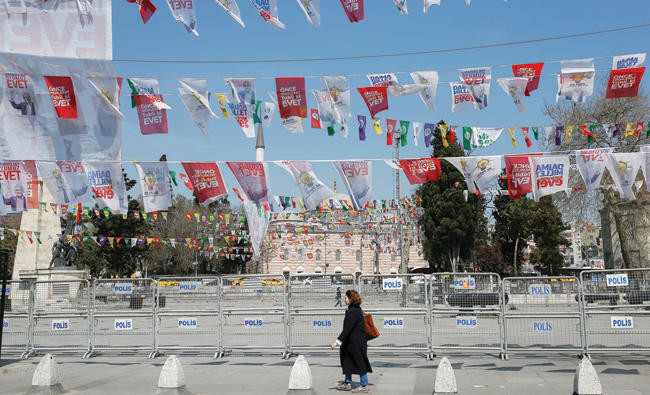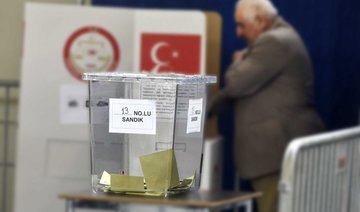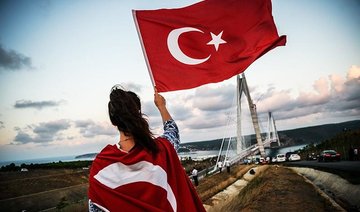ISTANBUL: Turkey votes on Sunday in a referendum on expanding the powers of the presidency under Recep Tayyip Erdogan. But the outcome could more broadly influence all aspects of the country’s future. Coming 94 years after the foundation of modern Turkey by Mustafa Kemal Ataturk, the referendum is a landmark vote that may affect relations with the West, a peace process with Kurds and dynamics inside society.
Here are five ways the referendum could shape Turkey:
• If he wins the referendum, Erdogan will enjoy enhanced powers, be able to appoint ministers and have an entire bureaucracy centralized within his presidential palace. Opponents worry that the new system will lack the “checks and balances” that mark the US system, moving the presidency toward one man rule.
The new system would be implemented from November 2019 when presidential and legislative elections would be held simultaneously.
With the clock wound back under the new system Erdogan, who became president in 2014, could take two more terms, allowing him to stay in power until 2029 rather than 2024, currently.
The executive presidency system “amasses unprecedented power in the hands of one man,” said Alan Makovsky, senior fellow at the Center for American Progress.
Erdogan in combative speeches has not countenanced the prospect of a “No” vote and not given the slightest indication he would consider his future. But given the advantages of the “Yes” campaign a “No” would be a massive blow to his status as Turkey’s all-powerful leader.
• Relations between Turkey, a longstanding candidate to join the EU, and its EU partners plunged to bitter lows during the referendum campaign as the president lashed out at Europe for what he said was behavior reminiscent of Nazi Germany.
Erdogan has said Turkey’s membership bid would be “on the table” after the referendum and in every single campaign speech said he would sign any bill restoring capital punishment, a move that would automatically end its bid to join the bloc.
“The tactics of constantly bullying the EU... for domestic political purposes have now reached their limits,” said Marc Pierini, visiting scholar at Carnegie Europe.
In the event of an easy “Yes” victory, Erdogan could have the confidence to take a decisive move away from EU integration and show Turkey can forge alternative strategic alliances, including with Russia.
One alternative to full membership could be a strengthened customs union, but it is unclear if that would be palatable for Erdogan.
• Erdogan was the first Turkish leader to undertake peace talks with the outlawed Kurdistan Workers’ Party (PKK), resulting in an unprecedented cease-fire.
But the PKK truce shattered in 2015 and Erdogan has since waged a controversial campaign to destroy the group. In the event of a “Yes,” it is not excluded that Erdogan could adopt a more reconciliatory attitude on the “Kurdish problem,” even to the point of reopening dialogue.
“In the case of a narrow “Yes” win, he (the president) may feel compelled to be conciliatory,” said Asli Aydintasbas, senior fellow at the European Council on Foreign Relations (ECFR). “Turkey could return to the peace process.” Yet the Yeni Safak daily has claimed that the government will open a new front with cross border operation against PKK camps in Sinjar, northern Iraq, in a new effort to destroy the group.
• Turkey’s hugely diverse society has starkly polarized during Erdogan’s tenure as prime minister and president since 2003. Erdogan has frequently demonized opponents, saying those who wanted to vote “No” were playing into the hands of the PKK and US-based Muslim cleric Fethullah Gulen, blamed for the failed July 15 coup.
“He wins, but in the end half of the country is in love with him, and the other half loathes him, and herein lies the crisis of modern Turkey,” said Soner Cagaptay, author of a forthcoming book, “The New Sultan.”
While Erdogan has forged a coalition with nationalists, he has in the past showed considerable pragmatism in his alliances.
• Markets are cautiously expecting a “Yes” and hoping this will bring much needed stability. A rally in Turkish assets is expected in the event of a “Yes.” In the medium term the prospects are much more uncertain, with some economists fearing that any democratic deficits in Turkey and increased polarization in society, coupled with the government’s loss of its enthusiasm for reform, will hit long term growth rates.
“While a potential “Yes” may be cheered by the market in the near term, Turkish equities are not likely to trade above historical averages as growth remains subdued and the long term implications of the system untested,” said economists at BGC Partners in Istanbul.
5 ways the vote could change Turkey
5 ways the vote could change Turkey

Syria to import electricity from Turkiye, rehabilitate Kilis-Aleppo natural gas pipeline

- Energy Minister discussed with the Turkish side the possibility of mining Syria’s earth minerals
- Government developing new 80-megawatt transmission line between Turkiye’s Reyhanli district and Syria’s Harem region
LONDON: The Syrian Arab Republic will import electricity from Turkiye and rehabilitate a natural gas pipeline connecting two border regions, the country’s energy minister said on Sunday.
Mohammed Al-Bashir stated that Damascus is finalizing an agreement to import electricity from Turkiye via a 400-kilovolt high-voltage transmission line that links the two countries.
Al-Bashir stated that the government is developing another 80-megawatt transmission line between Turkiye’s Reyhanli district and Syria’s Harem region to supply electricity to towns in northern Syria.
“Additionally, we are working to rehabilitate the natural gas pipeline connecting Kilis and Aleppo,” two cities in southern Turkiye and northern Syria, the minister added.
“Once operational, (the pipeline) could supply 6 million cubic meters of gas per day to Syria’s power generation stations, significantly improving our energy situation,” he added in a statement to the SANA news agency.
The minister said he discussed with the Turkish side the possibility of mining Syria’s mineral deposits, such as phosphate and lithium, and the prospect of exploring natural gas in the country’s national waters. He urged Turkish companies to invest in exploring Syria’s oil and natural gas potential, upgrading power lines and plants, and rebuilding refineries and transportation systems.
Israel vows retaliation against Iran, Yemen’s Houthis over airport attack

- It is the first time a missile has directly struck inside Israel's main airport, according to a military spokesperson
- Netanyahu said Israel would also respond to Iran at 'a time and place of our choosing'
TEL AVIV: Israeli Prime Minister Benjamin Netanyahu on Sunday vowed a response to Yemen’s Houthis and their Iranian backers after the militant group struck the area of Israel’s main airport, wounding six people and prompting several major airlines to suspend flights.
The strike came hours before Israel’s army confirmed the call-up of “tens of thousands” of reservists to expand the 19-month war in Gaza against Palestinian militants Hamas.
The military confirmed that the attack, which gouged a large crater in the perimeter of Tel Aviv’s Ben Gurion Airport, was launched from Yemen and had struck despite “several attempts... to intercept the missile.”
In a video published on Telegram, Netanyahu said Israel had “acted against” the Iran-backed group in the past and “will act in the future.”
“It will not happen in one bang, but there will be many bangs,” he added, without going into further detail.
Later on X, Netanyahu said Israel would also respond to Iran at “a time and place of our choosing.”
A police video showed officers standing on the edge of a deep hole in the ground with the control tower visible behind them. No damage was reported to airport infrastructure.
The police reported a “missile impact” at Israel’s main international gateway.
An AFP photographer said the missile hit near the parking lots of Terminal 3, the airport’s largest. The crater was just hundreds of meters from the tarmac.
Missile inside the airport
“You can see the area just behind us: a crater was formed here, several dozen meters wide and several dozen meters deep,” central Israel’s police chief, Yair Hezroni, said in the video.
“This is the first time” that a missile has directly struck inside the airport perimeter, an Israeli military spokesperson told AFP.
Earlier, the Houthis, who say they act in support of Palestinians in war-ravaged Gaza, claimed responsibility for the attack.
The group said their forces “carried out a military operation targeting Ben Gurion airport” with a “hypersonic ballistic missile.”
Defense Minister Israel Katz threatened a forceful response, saying: “Anyone who hits us, we will hit them seven times stronger.”
Palestinian militant groups Hamas and Islamic Jihad later hailed the attack on the airport.
Israel’s Magen David Adom emergency service said it had treated at least six people with light to moderate injuries.
An AFP journalist inside the airport at the time of the attack said he heard a “loud bang” at around 9:35 am local time, adding that the “reverberation was very strong.”
“Security staff immediately asked hundreds of passengers to take shelter, some in bunkers,” the AFP journalist said.
“Many passengers are now waiting for their flights to take off, and others are trying to find alternative flights.”
An incoming Air India flight was diverted to Abu Dhabi, an airport official told AFP.
It was one of the airlines to suspend Tel Aviv flights until Tuesday along with Italy’s ITA Airways and Germany’s Lufthansa Group, which includes Austrian, Eurowings and SWISS. Air France announced the cancelation of Sunday flights.
The Houthis, who control swathes of Yemen, have launched missiles and drones targeting Israel and Red Sea shipping throughout the Gaza war.
Israel resumed major operations across Gaza on March 18 amid a deadlock over how to proceed with a two-month ceasefire that had largely stopped the war.
Jordan’s tourism sector surges in first quarter of year with 19% rise in visitors, 8.9% revenue boost

- The surge was fueled by a 19 percent year-on-year rise in international arrivals
- Enhanced air connectivity, targeted international marketing campaigns and Continued investment in infrastructure reasons given for rise
AMMAN: Jordan’s tourism sector has kicked off 2025 strongly, registering growth in both visitor numbers and revenue, a Jordan News Agency report said on Sunday.
According to the Ministry of Tourism and Antiquities, tourism revenue reached 1.217 billion dinars ($1.72 billion) in the first quarter of the year, which equated to an 8.9 percent increase compared to the same period in 2024.
The surge was fueled by a 19 percent year-on-year rise in international arrivals, which reached 2.125 million between January and April.
Overnight visitors increased by 15.3 percent to 1.765 million, while the number of same-day visitors soared by 41.6 percent to 360,000 compared to early 2024.
April alone saw international arrivals jump by 36.7 percent to 617,000, suggesting that the strong momentum is likely to carry into the second quarter.
Ministry officials attributed the growth to several strategic initiatives.
Enhanced air connectivity, including new direct flights and expanded budget airline operations, has significantly improved access to Jordan, they said.
Meanwhile, targeted international marketing campaigns have successfully spotlighted the kingdom’s diverse tourism offerings, from heritage sites and desert landscapes to adventure and wellness experiences.
Continued investment in infrastructure has also played a role, they said, which has improved the visitor experience and enhanced the country’s overall competitiveness in the global travel market.
Beyond direct economic impact, tourism’s strong performance is boosting Jordan’s foreign currency reserves and generating employment across the hospitality and service sectors, JNA said.
Looking ahead, the ministry reaffirmed its commitment to a national tourism strategy grounded in sustainable development.
Its goals include increasing tourism’s contribution to GDP, creating long-term job opportunities, and solidifying Jordan’s position as a premier global destination by promoting its rich historical, cultural, and natural assets.
Flights again halted to Israel after Houthi missile lands near airport

- Many foreign airlines subsequently suspended flights to and from Tel Aviv after the missile hit
- Claiming responsibility for the strike, Houthis’ military spokesperson said Israel’s main airport was “no longer safe for air travel”
JERUSALEM: European and US carriers canceled flights for the next several days after a missile fired by the Houthis on Sunday landed near Israel’s Ben Gurion Airport, the country’s main international travel gateway.
Many foreign airlines subsequently suspended flights to and from Tel Aviv after the missile hit, sending a plume of smoke into the air and causing panic among passengers in the terminal building.
Following a ceasefire deal with Palestinian militant group Hamas in January, foreign carriers had begun to resume flights to Israel after halting them for much of the last year and a half since the Oct. 7, 2023 Hamas attack.
That left flag carrier El Al Airlines — along with smaller rivals Arkia and Israir — with a near monopoly. El Al’s shares rose 7 percent, while Israir gained 4.1 percent in a flat broader Tel Aviv market on Sunday.
Delta Air Lines said it canceled Sunday’s flight from JFK in New York to Tel Aviv and the return flight from Tel Aviv on Monday. United canceled its twice daily flights between Tel Aviv and Newark while it monitors the situation.
Earlier, flights from Tel Aviv on Delta and United on Sunday morning departed about 90 minutes late.
Lufthansa Group, which includes Lufthansa, Swiss, Brussels and Austrian, said it had halted flights to and from Tel Aviv through Tuesday due to the current situation.
ITA said it had canceled flights from Italy to Israel through Wednesday, while Air France canceled flights on Sunday, saying customers were transferred to flights on Monday. TUS flights to and from Cyprus were canceled through Monday, while Air India flights from New Delhi were halted on Sunday.
Ryanair suspended flights on Sunday but flights are still scheduled for Monday, according to the Israel Airports Authority. Wizz also halted flights.
“I’m afraid it’s going to be very difficult to go back to France because all European carriers, from what I see on the information (board), have canceled. Lufthansa have canceled, Swiss have canceled, Brussels (Airlines), so no connection is possible,” said Michael Sceemes, 56, whose Air France flight was canceled.
Aegean, flydubai and Ethiopian did not cancel flights.
El Al said it would reintroduce rescue flights to Israel from Larnaca and Athens for passengers stranded by foreign carriers at a cost of $99 and $149, respectively.
Udi Bar Oz, head of Ben Gurion Airport, said the airport was up and running less than 30 minutes after the missile hit a road nearby.
Claiming responsibility for the strike, the Houthis’ military spokesperson, Yahya Saree, said Israel’s main airport was “no longer safe for air travel.”
The Houthis, who control swathes of Yemen, began targeting Israel and Red Sea shipping in late 2023, during the early days of the war between Hamas and Israel in the Gaza Strip.
US President Donald Trump in March ordered large-scale strikes against the Houthis to deter them from targeting commercial shipping in the Red Sea.
Prime Minister Benjamin Netanyahu vowed to respond to the Houthis. “We attacked in the past, we will attack in the future ... There will be more blows,” he said.
Two held in Iran after deadly port explosion: state TV

- April 26 blast at a dock in the southern port of Shahid Rajaee killed at least 57 people and injured more than 1,000, officials said, revising down an earlier death toll
TEHRAN: Iranian authorities arrested two people including a government official in connection with a deadly explosion last month at the country’s main commercial port, state television reported on Sunday.
The April 26 blast at a dock in the southern port of Shahid Rajaee killed at least 57 people and injured more than 1,000, officials said, revising down an earlier death toll.
The judiciary on Sunday said the toll had been revised because “it was determined that some of the bodies considered separate were in fact one body,” adding that it could still change.
At the time of the blast, Interior Minister Eskandar Momeni blamed “shortcomings, including noncompliance with safety precautions and negligence.”
Shahid Rajaee is near Iran’s coastal city of Bandar Abbas on the Strait of Hormuz, a waterway through which one-fifth of global oil output passes.
“A government manager and another from the private sector have been arrested,” state television said on Sunday, citing a report from the investigating committee.
The committee announced on Monday that “false declarations (of goods) were made in some cases.”
It said on Sunday that “suspects have been identified and the summoning process is underway,” without elaborating.
The New York Times has quoted a person with ties to Iran’s Islamic Revolutionary Guard Corps, speaking on condition of anonymity to discuss security matters, as saying that what exploded was sodium perchlorate — a major ingredient in solid fuel for missiles.
Iran’s defense ministry spokesman Reza Talaei-Nik later told state television that “there has been no imported or exported cargo for military fuel or military use in the area.”





















